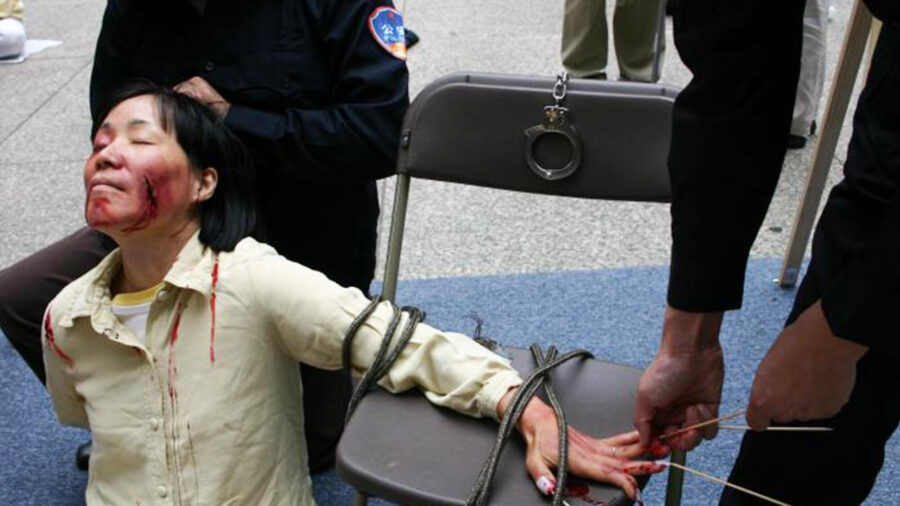Even while trying to contain the pandemic in China, the communist regime continued to persecute adherents of spiritual group Falun Gong, a leaked internal document from 2020 shows.
The official document, from a district in eastern China, listed a campaign to suppress Falun Gong practitioners among the key achievements in that area in 2020, alongside other tasks such as controlling the pandemic and “maintaining social stability.”
Falun Gong, also known as Falun Dafa, is a spiritual practice that originated in northeastern China in 1992, featuring five slow-moving exercises and moral teachings based on the tenets of truthfulness, compassion, and tolerance.
Official data reported that 70-100 million adherents had practiced in China by 1999. However, after the Chinese regime felt threatened by the popularity and independence of the practice, it began to persecute Falun Gong in July 1999 and millions have been detained inside prisons, labor camps, and other facilities, according to the Falun Dafa Information Center.
The Epoch Times recently obtained an internal document, “2020 Work Summary and 2021 Work Plan of the district PLAC,” issued by the Wuzhong district Political and Legal Affairs Commission (PLAC) of the Chinese Communist Party (CCP) in November 2020.
Wuzhong is a district located in Suzhou city of Jiangsu Province, an eastern-central coastal province of China.
The PLAC, a communist agency that oversees the country’s police, courts, and prisons, has branches in each province, city, and township.
In its work summary for 2020, the district PLAC said that it had launched a 100-day campaign to further suppress Falun Gong and its adherents, carrying out so-called “educational transformation.”
“Transformation,” a name given by the CCP, means to force Falun Gong practitioners to denounce the belief through harassment, brainwashing, and torture. Thousands are confirmed to have been brutally persecuted to death.
17 Deaths in Wuzhong District
The Epoch Times obtained another data report in 2017 from the State Security Brigade in Wuzhong, indicating that at least 17 Falun Gong practitioners in Wuzhong district died for holding onto their faith.
According to the document, by July 24, 2017, 153 local practitioners had been monitored by Wuzhong authorities, with 76 people under observation.
The total number of deaths in this district was 17, the report said.
Since July 1999, over 4,600 Falun Gong adherents have been killed in the persecution in China. Victims’ names, statistical data, and brief summaries of confirmed deaths are available on Minghui.org.
The actual number of deaths is thought to be much higher as thousands of cases remain unconfirmed.
‘Door Knocking’ Campaign
Additionally, the report shows in early May 2017, the Wuzhong brigade carried out 24 in total door-to-door visits to local Falun Gong practitioners, responding to a “door knocking” directive issued by the Chinese Ministry of Public Security.
Since February 2017, this campaign has spread to 28 provinces, municipalities, and regions in mainland China to collect personal information, photograph, videotape, or even arrest Falun Gong practitioners, according to Minghui.
Due to its effort in persecuting Falun Gong, Wuzhong district was rated as a “model district” by the Chinese regime’s State Council in 2015. The “2021 Work Plan” also sets a target goal of absolute control over Falun Gong practitioners.
In 1999, Falun Gong was vilified by the Chinese Communist Party as a “heretical religion” in mainland China. The term is often mistranslated into English as “cult.”
A 2017 report (pdf), “The Battle for China’s Spirit,” released by U.S.-based nonprofit Freedom House, states that Falun Gong has no attributes of a cult.
“The propaganda apparatus seized on a manipulated English translation of the Chinese term ‘xiejiao’ [heretical religions]. This suggests that the term was applied retroactively to justify a violent campaign that was provoking international and domestic criticism.”
Falun Gong is now practiced in more than 90 countries worldwide, while its main text, “Zhuan Falun,” has been translated into 40 languages.
Beijing’s Anxiety
Another report from the Suzhou municipal PLAC, named “Suzhou Political and Legal Opinion Weekly Report,” reveals Beijing’s concerns over Falun Gong. The document is labeled as “Internal Information.”
In the “Recent Risks and Suggestions” section, the document suggests preventing Falun Gong from spreading “propaganda,” mentioning relevant banners that have appeared among communities in a nearby city, Xiaogan, Hubei Province.
The report was issued on May 12, 2017, one day before “World Falun Dafa Day,” which is the birthday of the founder of Falun Dafa, Li Hongzhi.
Since 2000, every year on May 13, Falun Dafa practitioners worldwide gather to celebrate World Falun Dafa Day to show gratitude to its founder. Meanwhile, mainland China practitioners choose to post flyers and hang banners in public places during this period, under the regime’s pressure.
The last internal document issued by the authority in Xuzhou city, Jiangsu Province, is related to “platform keyword classification.”
It shows “Falun Gong” is listed as keywords to censor public opinions, along with many others, such as topics related to severe accidents, mass protests, political dissidents, and human rights lawyers.
From The Epoch Times

